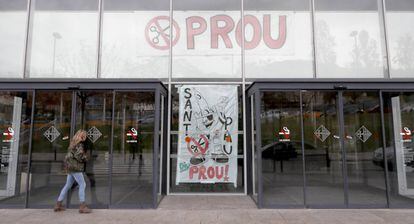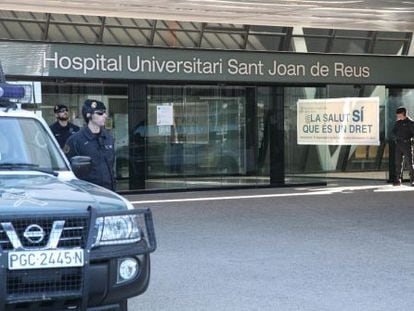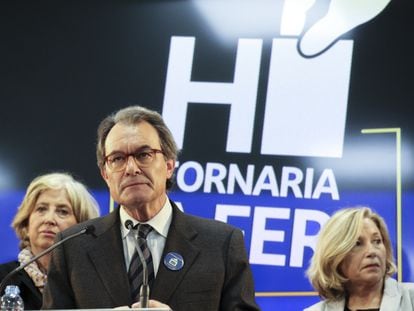Healthcare funding slashed in Catalonia during independence push
Regional system shed 2,400 jobs and lost 1,100 hospital beds under former premier Artur Mas


Catalonia’s public health system is feeling the effects of political instability in a region that has held three early elections since 2012.
A new study by the State Association of Directors and Managers of Social Services shows that Catalonia is the region that experienced the deepest cuts to social spending during the economic recession, between 2005 and 2015.
Faced with political and social opposition, the Catalan government was forced to backtrack on some of its decisions
The ups and downs of the pro-independence drive have affected the quality of healthcare: the system was first hit by budget cuts enacted by former premier Artur Mas in the middle of the economic crisis; later it was unable to implement necessary structural changes because of governmental delays.
Most of the region’s health-management powers have been devolved to the Catalan government. As such, Barcelona could not blame Madrid for the health cuts beyond the generic claims of “chronic underfunding” made by the health department chief at the time, Boi Ruiz.
The cuts caused profound social and political malaise in Catalonia, where street protests became a regular occurrence. But the growing independence debate soon overshadowed these issues.
Deficit reduction
While the central government was working to bring down the deficit at the national level, Mas did the same in Catalonia by slashing over €1.5 billion from the health budget, which dropped from €9.8 billion in 2010 to €8.3 billion.
According to the study, Castilla-La Mancha and Catalonia were the two regions that saved the most on social spending – which comprises health, education and social services – between 2009 and 2015. In total, there was a reduction of over 26%.

Under the austerity measures, the Catalan health department closed down surgery rooms in the afternoons, reduced the opening hours of primary care centers, stopped hiring substitutes to cover for health professionals on leave, and shut down entire floors in some hospitals to reduce personnel costs.
Under two Mas administrations, the Catalan health system lost 2,400 health professionals (from 76,306 in 2011 to 73,899 in 2015) and over 1,100 hospital beds (from 14,072 in 2010 to 12,902 in 2015). Workers, unions and social groups protested on the streets against the long waiting lists, overcrowded emergency rooms and overworked employees.
Long waits
When Carles Puigdemont became the new premier in January 2016 and placed Toni Comín at the helm of the health department, the latter promised that independence from Spain would end the waiting lists.
“I need €1 billion to reduce the list to the bare minimum, to nothing. The most sure-fire way to get this billion is independence,” he told the regional parliament in February 2016.
Comín also introduced an action plan to start improving the figures. So far, waiting times have gone down for diagnostic tests, but have grown for surgery.
According to the latest available figures from the Catalan health department, in October 2017 there were 119,648 patients waiting an average 69 days to undergo a diagnostic test. Health workers and unions say that Catalans have to wait up to three weeks in some cases to see their primary care physician.
By then, the ruling Convergence and Union (CiU) was already flirting with the pro-sovereignty movement. It was then that the far-left CUP party unveiled what would become the biggest corruption scandal of the Catalan health system. The Innova case involved faulty orthopedic implants and illegal payments made by local authorities in Reus (Tarragona) to top health officials at the Catalan Health Service and the Catalan Health Institute (ICS), which runs eight major hospitals and 80% of all primary healthcare in the region.
During Mas’s second tenure, the public debate over independence overshadowed his controversial plan to overhaul the health system by privatizing several public services and taking apart the ICS. A report by the consulting firm PwC revealed by EL PAÍS showed that Mas intended to privatize several hospitals. The study recommended “a two-phase influx of private capital to dilute the political and social impact” of the plan. Management of several primary health centers was awarded to Eulen, a private company with no prior experience in the sector.
But faced with social and political opposition, the Catalan government was forced to backtrack on some of its decisions. Mas’s governing partner, the Catalan Republican Left (ERC), withdrew its support on several health-related issues. Workers at Bellvitge Hospital in L’Hospitalet cut off the Gran Vía to Barcelona once a week for several months to protest the cuts. And patients set up information stands outside the hospitals to show people how to file complaints over long waiting lists. In the summer of 2014, patients and local residents locked themselves inside hospitals to prevent their summer closure.
Meanwhile, the courts forced Mas to backtrack on a controversial co-payment system that would have charged people one euro per prescription.
English version by Susana Urra.












































